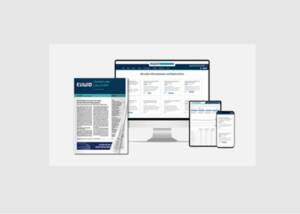The Importance of Paper in Learning and Literacy
News General news
Over the last two decades, technology has become part of almost every facet of our lives. The expansion of broadband, smartphones and portable technology has changed how we communicate, access information, work and learn.

While many of these changes are positive, there is growing evidence that this isn’t always the case. In recent years, there has been a gradual shift away from paper-based learning materials in schools toward digital and online tools. This shift accelerated rapidly during the pandemic when almost all schools moved lessons online. Research has shown that this increasing reliance on digital methods and resources may be negatively affecting the ability of students to learn and remember information. There is also growing concern about the impact of digital technology on mental and physical health.
Digital Vs. Paper-Based Materials: Learning
A 2018 meta analysis examined 54 studies involving more than 171,000 readers that compared reading from digital text with reading from printed text. The analysis found that comprehension was better overall when people read printed as opposed to digital texts.
In ähnlicher Weise ergab eine Studie mit Millionen von Schülern in den 36 Ländern der Organisation für wirtschaftliche Zusammenarbeit und Entwicklung (OECD), dass diejenigen, die Computer in der Schule intensiv nutzen, "bei den meisten Lernergebnissen deutlich schlechter abschneiden, selbst wenn man den sozialen Hintergrund und die demografischen Merkmale der Schüler berücksichtigt". Eine andere Analyse ergab, dass Schüler der vierten Klasse (etwa 9 bis 10 Jahre alt), die in allen oder fast allen Klassen Tablets benutzten, im Durchschnitt 14 Punkte schlechtere Leseergebnisse erzielten als diejenigen, die sie nie benutzten - eine Differenz, die einer ganzen Klassenstufe entspricht.
Patricia Alexander, eine Psychologin an der Universität von Maryland, die untersucht, wie wir lernen, hat herausgefunden, dass Schüler zwar glauben, dass sie beim Online-Lesen mehr lernen, aber Tests zeigen, dass sie tatsächlich weniger lernen als beim Lesen von gedruckten Texten. Ein Teil des Problems kann auf die Geschwindigkeit zurückgeführt werden, mit der wir normalerweise Texte auf einem Bildschirm lesen, von denen viele leicht verständliche Textnachrichten oder Beiträge in sozialen Medien sind. Wenn es darum geht, komplexere Informationen auf dem Bildschirm zu lesen, die mehr Aufmerksamkeit und Nachdenken erfordern, neigen die Menschen immer noch dazu, sie zu überfliegen, anstatt sie richtig zu lesen.
As well as encouraging us to read quickly, reading online usually involves scrolling, which can make it hard for the brain to create mental maps that help us to remember. When reading a printed book, for example, it’s easy to know roughly which page you’re on, but that’s far more difficult when scrolling through text on a screen. A 2019 study revealed that it’s not just when scrolling that the brain struggles to make mental maps. When a group of 50 participants was asked to read a 28-page story, half of them read a printed version and the other half read the story on an e-reader. Those reading the printed version understood the chronology of the plot better than those reading the digital version. The researchers suggest that “the haptic and tactile feedback of an e-reader does not provide the same support for mental reconstruction of a story as a print book does.”
The benefits of paper-based learning materials aren’t restricted to reading; writing on paper rather than typing on a keyboard can also produce better results. A 2014 study compared the outcome of students taking lecture notes by hand with those who took notes on a laptop. When it came to testing the students on their knowledge of the information, they were allowed to review their notes for 10 minutes before the test. Those who took longhand notes performed better on both factual and conceptual questions.
The authors of the study concluded that “laptop use can negatively affect performance on educational assessments, even — or perhaps especially — when the computer is used for its intended function of easier note taking. For that reason, laptop use in classrooms should be viewed with a healthy dose of caution; despite their growing popularity, laptops may be doing more harm in classrooms than good.”
Perhaps one of the most noticeable differences between reading printed matter compared to reading on a screen is distraction. When reading from a screen, we’re more often than not connected to other services, which bring with them pop-ups and pings from social media, emails and text messages, all of which divert our attention and break concentration. Even in schools, depending on the school’s policy, this can be an issue, particularly when tech-savvy students know how to bypass firewalls and other restrictions.
Digital Vs. Paper-Based Materials: Mental and Physical Health
There is growing concern about the impact of digital devices on mental health, including increased rates of anxiety and depression. With devices now being used by students in school as well as outside the classroom, there is little respite from the constant stimulation they deliver. Paper-based learning materials, in addition to providing cognitive benefits, also provide a much-needed break from the digital world.
A study conducted by researchers at the University of Washington found that students who used paper-based planners were less likely to experience symptoms of anxiety and depression than those who used digital planners. Published in 2017, the study involved 264 undergraduate students who were randomly assigned to use either a paper-based planner or a digital planner. The researchers found that the students who used the paper-based planner reported lower levels of anxiety and depression than those who used the digital planner.
The negative effect of digital devices isn’t limited to their use during the day. The blue light these devices emit also affects how well we sleep. A study conducted by researchers at Harvard Medical School found that those who read from a tablet took longer to fall asleep, had less REM sleep, and felt less rested in the morning than those who read from a paper book.
Poor sleep quality can bring with it a range of negative health consequences. In addition to the effect poor sleep has on mental well-being, it also increases the risk of obesity, diabetes, and cardiovascular disease.
Conclusion
Compared to centuries of paper use, digital and online educational tools are very much in their infancy, with much research still to be done on their impacts. A growing body of research suggests that a switch to electronic learning materials from paper-based materials may be detrimental to students’ ability to learn and remember information, as well as to their overall health and well-being. With healthy, well-educated students as the ultimate goal, perhaps we should slow or even pause the shift to digital materials in schools until we more fully understand their effects on learning and literacy.










